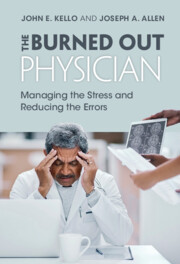Book contents
- The Burned Out Physician
- The Burned Out Physician
- Copyright page
- Dedication
- Contents
- Figures and Tables
- Preface
- Acknowledgments
- Chapter 1 The Psychology of Burnout
- Chapter 2 The Burned-Out Physician
- Chapter 3 Types of Medical Error
- Chapter 4 Sources of Medical Error
- Chapter 5 How-To Strategies for Addressing the Crisis
- Chapter 6 Solution #2: Engage in Self-Care
- Chapter 7 Solution #3: Seek Social Support
- Chapter 8 Solution #4: Follow the Advice You Would Give Patients
- Chapter 9 Solution #5: Perform Effective Team Leadership
- Chapter 10 Solution #6: Ensure Collaborating Team Members
- Chapter 11 Solution #7: Establish and Sustain a Positive Team Culture
- Chapter 12 Solution #8: Make Changes in Workflow in Organizations
- Chapter 13 Solution #9: Make Changes in Management Practices in Local Healthcare System Top Leaders
- Chapter 14 Solution #10: Make Changes in Overall Healthcare System Processes
- Chapter 15 Solution #11: Make Changes in National Healthcare
- Chapter 16 Saving the Burned-Out Physician
- Index
- References
Chapter 5 - How-To Strategies for Addressing the Crisis
Solution #1: Understand Your Personality
Published online by Cambridge University Press: 08 July 2022
- The Burned Out Physician
- The Burned Out Physician
- Copyright page
- Dedication
- Contents
- Figures and Tables
- Preface
- Acknowledgments
- Chapter 1 The Psychology of Burnout
- Chapter 2 The Burned-Out Physician
- Chapter 3 Types of Medical Error
- Chapter 4 Sources of Medical Error
- Chapter 5 How-To Strategies for Addressing the Crisis
- Chapter 6 Solution #2: Engage in Self-Care
- Chapter 7 Solution #3: Seek Social Support
- Chapter 8 Solution #4: Follow the Advice You Would Give Patients
- Chapter 9 Solution #5: Perform Effective Team Leadership
- Chapter 10 Solution #6: Ensure Collaborating Team Members
- Chapter 11 Solution #7: Establish and Sustain a Positive Team Culture
- Chapter 12 Solution #8: Make Changes in Workflow in Organizations
- Chapter 13 Solution #9: Make Changes in Management Practices in Local Healthcare System Top Leaders
- Chapter 14 Solution #10: Make Changes in Overall Healthcare System Processes
- Chapter 15 Solution #11: Make Changes in National Healthcare
- Chapter 16 Saving the Burned-Out Physician
- Index
- References
Summary
A critical individual-level solution involves increasing self-awareness and greater understanding in terms of one’s personality traits, especially in terms of how one reacts to stressful circumstances. Some personality traits, such as moderately strong extraversion, agreeableness, conscientiousness, hardiness/resilience, and generalized self-efficacy are associated with reduced stress reaction. Individuals with those personality dimensions are dispositionally able to handle stressful situations better than others. Their personality buffers the stress reaction. By the same token, individuals with some forms of “Type A” personality, or who are strong in neuroticism, for example, are more likely to show strong reactions to stressful situations. It is helpful for individuals to identify their personality factors, especially the strong ones, to understand their capacities to endure stress without experiencing burnout. It is also important for them to identify personality traits that might predispose them to experiencing a strong stress reaction and to identify what are called “work-around” strategies to help buffer them from the deleterious, undoing effects of stress.
- Type
- Chapter
- Information
- The Burned Out PhysicianManaging the Stress and Reducing the Errors, pp. 81 - 94Publisher: Cambridge University PressPrint publication year: 2022



